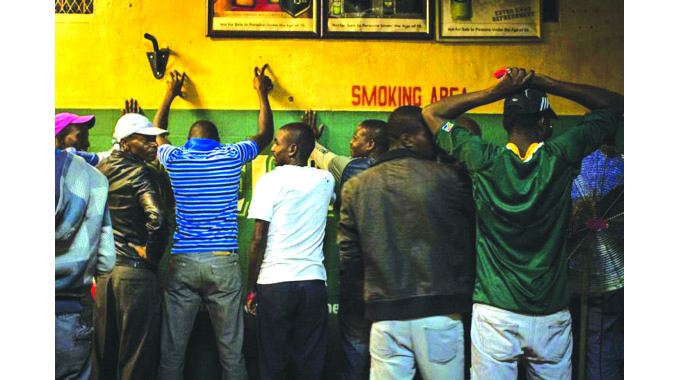When students turn into criminals

Latwell Nyangu
Youth Interactive Writer
Students’ crime is not naturally born in them but is largely due either to the spirit of adventure that is in them, to their stupidity or to lack of discipline.
While crime is common. Logic is rare. Therefore, it is upon the logic rather than upon the crime that you should dwell on.
Fellow students, the issue of crimes being committed in colleges is escalating among students and this is becoming a serious issue of concern in our country as it has turned to be contagious to several learners.
If you are a college student who has been charged with a crime, whether a misdemeanour’s or a felony, the stakes are high.
Your future, including continued attendance at your college and employment and graduate school opportunities, is hanging in the balance.
Crime gives a negative impact on the emotional development of the learner.
It has become evident that crime on campus is a problem that affects students and staff. The amount and type of crime on campuses have implications for students’ educational and social development. This is because they are less likely to attend, spend time on, or participate in social activities on high-crime campuses.
I understand that the study of crime on campus is a broad one that requires many variables to be studied more closely. These include variables such as home environment; negative peer influence; inadequate parenting style; poor coping skills; low self-esteem; poor interpersonal skills; inappropriate solutions to stressful situations; as well as drug and alcohol abuse.
Fellow students, crime is undeniably a serious issue of concern among us students, parents of prospective students, campus law enforcement personnel, and the campus community as a whole.
Many students enter university with negative family, social and economic experiences in their backgrounds. This could be a result of a shaky high school life that left the student traumatised or even motivated to engage in criminal activity. Such factors act as a catalyst in the rate of crime that occurs on campus.
As violence increases and filters into the adolescent and young population, and as the number of students registering at universities rises, there will inevitably be an increase in the rates of crime in our institutions. This has been evident in the nature and incidences of crime that have been depicted previously.
The crimes of rape, theft, assault, vandalism, and murder have seen students being arrested and it’s affecting the reputation of university institutions dramatically.
While as students and staff at tertiary institutions engage in our routine activities on campus in an attempt to maintain this idealistic view of a tertiary institution, we are not immune to becoming victims of crime.
Notwithstanding the complex factors at play, it is a piece of the puzzle so critical to understanding crime and violence among students, if grasped and addressed, may drastically reduce and even prevent its scourge and, as we will come to see, its intergenerational effects.
And committing small crimes is one thing and becoming a full-fledged criminal is another. Sadly, many of us are becoming full-time criminals. Like I always say, I write what I see, what we do.
For the past weeks, some of us have been making headlines in the newspapers for the wrong reasons.
As a scribe of many years in the industry, I have seen students being reported and arrested for rape, stealing and killing each other.
Once again we are found wanting. We have grabbed the headlines involving drugs, from selling to consuming them. It’s like a relay where we are passing on the baton. Some of us are involved in prostitution, we end up being arrested for loitering.
For a very long time, it was believed that it is the student’s brain that makes them criminals, but scientific studies have proved that it’s not just the brain but also some factors including poverty, peer pressure, experiments, monetary reasons that turns an innocent kid into a hardened criminal.
It’s natural for students to compare themselves with others and when they feel that their colleagues are richer and financially more stable than them, they ultimately start looking for wrong ways to bridge the gap.
Students usually start with small crimes like theft to fulfil their daily expenses, but with time, they keep falling deeper and deeper into the life of crime.
But, why put a dent in your reputation and put your future profession at stake?
College students facing criminal charges, often-times far from home without immediate help and support from family, can be a stressful and terrifying experience.
With the rate of students’ crimes increasing day by day, there has been a lot of debate on how best can crime prevention be instituted. While there is a consensus on taking measures to save students from going astray, very little seems to have been done in this regard.
The primary reason for this is the confusion about the causes behind students’ crimes. Unless those trying to break the trend are clear on what they need to be targeting, success will continue to slip through their hands.
I will agree that it is important we understand that a child is not born with criminal tendencies. There are always some factors that contribute to students’ crime, leading them to dangerous situations. The most common types of student crimes include criminal mischief, rape, burglary, and misconduct.
Certainly, a definite intervention is required at an early stage, and to prevent juvenile crime, its root causes must first be clearly understood.
As young people we reach adolescence, and we go through several changes. All of a sudden, we wish to become independent and develop our liking.
We want to be known and accepted by our peers and social groups. To fit in and be accepted by our peers, we succumb to peer pressure.
A few months ago I wrote something about the consequences of peer pressure which comes with both positive and negative influences.
Research in the past has proved that many young people cite peer pressure as one of the major reasons for engaging in risky behaviours such as reckless driving, substance abuse, alcohol, teen sex, teen gang, and criminal activity.
Getting influenced by their peers’ behaviour, most teens get involved in risky activities and put themselves in huge problems. If the young are taught to differentiate between right and wrong, they can be more careful about choosing the path for themselves.
Cases of us students becoming criminals are rising daily and it’s worrying.
Of course, it’s not written anywhere on who should commit a crime but students should stay away from crimes.
I always tell people in my circles, as an individual you should ask yourself why, what, and how before you do anything.
The students who ask themselves these questions will always have an impact. Ask yourself WHAT is it that you are doing, WHY are you doing it and HOW are you going to do it.
But one thing that I have realized in some of the students who have lost the plot is that they regret falling victim.
Stay away from crime and peace will be upon you.







Comments